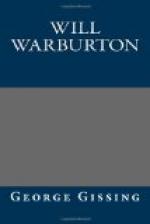“So you’ve come to London to hunt for curios?” interposed Will.
“No, no; let me go on. When I got to know Milligan well, I found that he had a large estate somewhere in Connaught. And, as we talked, an idea came to me.” Again he sprang up from his chair. “’If I were a landowner on that scale,’ I said, ’do you know what I should do—I should make a vegetarian colony; a self-supporting settlement of people who ate no meat, drank no alcohol, smoked no tobacco; a community which, as years went on, might prove to the world that there was the true ideal of civilised life—health of mind and of body, true culture, true humanity!’” The eyes glowed in his fleshless, colourless face; he spoke with arm raised, head thrown back—the attitude of an enthusiastic preacher. “Milligan caught at the idea—caught at it eagerly. ’There’s something fine in that!’ he said. ‘Why shouldn’t it be done?’ ’You’re the man that could do it,’ I told him. ’You’d be a benefactor to the human race. Isolated examples are all very well, but what we want is an experiment on a large scale, going on through more than one generation. Let children be born of vegetarian parents, brought up as vegetarians, and this in conditions of life every way simple, natural, healthy. This is the way to convert the world.’ So that’s what we’re working at now, Milligan and I. Of course there are endless difficulties; the thing can’t be begun in a hurry; we have to see no end of people, and correspond with the leaders of vegetarianism everywhere. But isn’t it a grand idea? Isn’t it worth working for?”
Warburton mused, smiling.
“I want you to join us,” said Sherwood abruptly.
“Ho, ho! That’s another matter.”
“I shall bring you books to read.”
“I’ve no time. I’m a grocer.”




